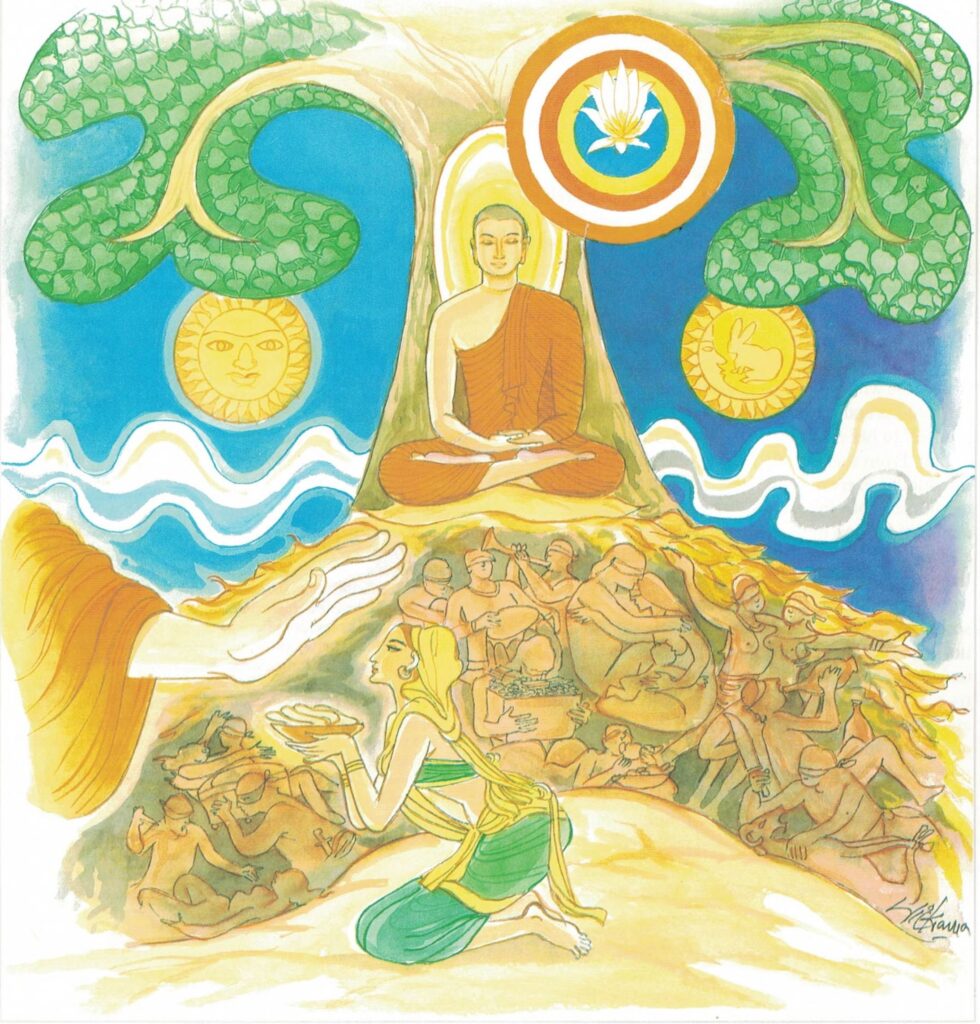Pali text, illustration and English translation of Dhammapada verse 226:
sadā jāgaramānānaṃ ahorattānusikkhinaṃ |
nibbāṇaṃ adhimuttānaṃ atthaṃ gacchanti āsavā || 226 ||
226. For the ever-vigilant who train by day and night upon Nibbāna e’er intent pollutions fade away.

The Story of Puṇṇā the Slave Girl
While residing at the Gijjhakūta Mountain, the Buddha spoke this verse with reference to a slave girl in Rājagaha.
The story goes that one day they gave her much rice to pound. She pounded away until late at night, lighting a lamp to work by; finally, she became very weary and, in order to rest herself, stepped outside and stood in the wind with her body moist with sweat. Now at that time Dabba the Malla was steward of lodgings for the monks. Having listened to the Dhamma, that he might show the monks the way to their respective lodgings, he lighted his finger, and preceding the monks, created by supernatural power a light for them. The light enabled Puṇṇā to see the monks making their way along the mountain. She thought to herself, “As for me, I am oppressed by my own discomfort, and so, even at this time, am unable to sleep. Why is it that the reverend monks are unable to sleep?” Having considered the matter, she came to the following conclusion, “It must be that some monk who resides there is sick, or else is suffering from the bite of some reptile.” So when it was dawn, she took some rice-dust, placed it in the palm of her hand, moistened it with water, and having thus mixed a cake, cooked it over a bed of charcoal. Then, saying to herself, “I will eat it on the road leading to the bathing-place on the river,” she placed the cake in a fold of her dress, and taking a water-pot in her hand, set out for the bathing-place on the river.
The Buddha set out on the same path, intending likewise to enter that village for alms. When Puṇṇā saw the Buddha, she thought to herself, “On other days when I have seen the Buddha, I have had no alms to give him, or if I have had alms to give him, I have not seen him; today, however, not only do I meet the Buddha face to face, but I have alms to give him. If he would accept this cake without considering whether the food is of inferior or superior quality, I would give it to him.” So, setting her water-pot down on one side she saluted the Buddha and said to him, “Venerable, accept this coarse food and bestow your blessing upon me.” The Buddha looked at Venerable Ānanda, whereupon the Venerable drew from under a fold of his robe and presented to the Buddha a bowl which was an offering to the Buddha from a great king. The Buddha held out the bowl and received therein the offering of the cake. When Puṇṇā had placed the cake in the Buddha’s bowl, she saluted him with the five rests and said to him, “Venerable, may the truth which you have beheld be of avail also to me.”
The Buddha replied, “So be it.” Thought the Buddha to himself, “What was the thought in the mind of this woman?” Perceiving what was in her mind, the Buddha looked at Venerable Ānanda and intimated that he wished to sit down. The Venerable spread out a robe and offered the Buddha a seat. The Buddha sat down and ate his breakfast. When the Buddha had finished his breakfast, he addressed Puṇṇā and said, “Puṇṇā, why have you blamed my disciples” “I do not blame your disciples, Venerable.” “Then what did you say when you saw my disciples?” “Venerable, the explanation is very simple. I thought to myself, ‘As for me I am oppressed by my own discomfort, and so am unable to sleep; why is it that the Venerables are unable to sleep? It must be that some monk who resides there is sick, or else is suffering from the bite of some reptile.’” The Buddha listened to her words and then said to her, “Puṇṇā, in your own case it is because you are afflicted with discomfort that you are unable to sleep. But my disciples are assiduously watchful and therefore sleep not.”
Explanatory Translation (Verse 226)
sadā jāgaramānānaṃ ahorattaṃ anusikkhinaṃ
nibbāṇaṃ adhimuttānaṃ āsavā atthaṃ gacchanti
sadā: always; jāgaramānānaṃ [jāgaramānāna]: wakeful; ahorattaṃ [ahoratta]: day and night; anusikkhinaṃ [anusikkhina]: given to discipline; nibbāṇaṃ adhimuttānaṃ [adhimuttāna]: bent on nibbāna; āsavā: (of that person) taints; atthaṃ gacchanti: get extinguished
Of those who are perpetually wakeful–alert, mindful and vigilant–who are given to disciplining themselves and studying day and night, intent upon the attainment of Nibbāna, the taints and cankers get extinguished.
Commentary and exegetical material (Verse 226)
āsavā: taints; blemishes. Striving for enlightenment, the Buddha understood the āsavās;their arising and their cessation. With that knowledge his mind was liberated from the āsavās (taints): of kāmāsava (sense-pleasures); of bhavāsava (becoming); and of avijjāsava (ignorance). In this way he was liberated.